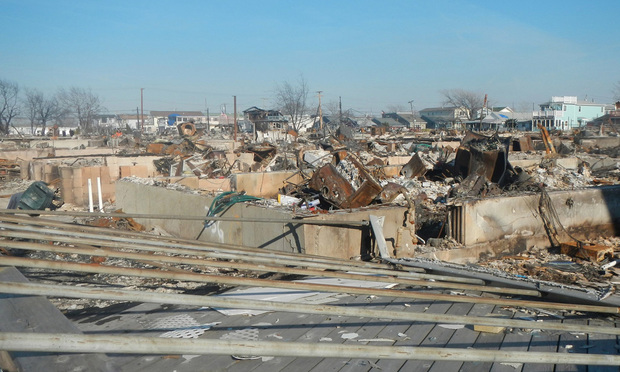Superstorm Sandy Suits Over Breezy Point Conflagration Can Proceed: Top NY Court
Lawsuits accusing the Long Island Power Authority, LILCO and National Grid Electrical Services of negligence over fires that destroyed dozens of homes in Breezy Point, Queens, during Superstorm Sandy in 2012 can go forward, New York's highest court ruled Tuesday.
February 20, 2018 at 02:26 PM
4 minute read
 Breezy Point in Queens after Hurricane Sandy and fires damaged the area.
Breezy Point in Queens after Hurricane Sandy and fires damaged the area. ALBANY — Lawsuits accusing the Long Island Power Authority, LILCO and National Grid Electrical Services of negligence over fires that destroyed dozens of homes in Queens during Superstorm Sandy in 2012 can proceed, New York's highest court ruled Tuesday.
In a 6-0 ruling, New York's Court of Appeals rejected LIPA's request to dismiss lawsuits filed by homeowners on Breezy Point who allege that LIPA was negligent by failing to shut off power to the electrical grid to the peninsula before the October 2012 storm. According to court documents, Con Edison, the power supplier for most of the five boroughs, did so pre-emptively. By failing to turn off the power to the Rockaway Peninsula, the surge of salt water made contact with live power lines resulting in a conflagration that destroyed more than 100 homes, plaintiffs allege.
LIPA had argued that it was immune from liability because the actions that were exercised during the storm were in LIPA's governmental capacity, and were discretionary.
The ruling by the Court of Appeals affirms a decision by the Appellate Division, Second Department, denying the defendant's motion to dismiss the claims. The appellate division held that LIPA wasn't entitled to governmental immunity because providing electricity is “properly categorized as a proprietary function” and that providing electricity and responding to a hurricane are “part of the proprietary core functions of electric utilities.”
In the Court of Appeals opinion, No. 11 Connolly v. Long Island Power Authority, No. 12 Baumann v. Long Island Power Authority, No. 13 Heeran v. Long Island Power Authority, Associate Justice Leslie Stein wrote, “because defendants have not met their threshold burden of demonstrating that the action was governmental in the context of these pre-answer, pre-discovery CPLR 3211 (a)
(7) motions, we cannot say that the complaints fail to state causes of action as a matter of
law. We therefore affirm,” the lower court's decision, Stein wrote.
“Inasmuch as defendants have failed to meet their burden to establish that plaintiffs' amended complaints failed to state viable claims, we hold that the courts below properly denied LIPA's motions to dismiss. Accordingly, in each appeal, the order of the Appellate Division should be affirmed, with costs, and the certified question answered in the affirmative,” Stein concluded.
Brian Shoot, a member of Sullivan Papain Block McGrath & Cannavo, the personal injury firm that represented several residents of the Rockaway Peninsula, said in a phone interview Tuesday morning that he was “very pleased” with the court's decision. The next step is the completion of discovery to find out who was responsible for the decision not to shut off power to the area, he added.
Eric Schwarz, also a member of the firm, said in a statement that “LIPAs repeated attempts to block this case from moving forward has ravaged the families and businesses who simply want their day in court.”
“Today's ruling is a step in the right direction for our clients and all those who are seeking some sort of closure on this issue so they can finally try to move on with their lives as best they can,” Schwarz added.
Brian Isaac, a partner in the litigation department of Pollack, Pollack, Isaac & DeCicco, also represented plaintiffs in the matter. Isaac did not respond to request for comment on the decision.
Zachary Murdock—a partner at Long Island-based full service law firm Lazer Aptheker Rosella & Yedid—who represented LIPA, said in email that the decision “to keep power on to critical care facilities, first responders, and people's homes was prudent and protected under our government immunity status and will continue to present our position in court.”
Chief Judge Janet DiFiore and Associate Judges Rowan Wilson and Paul Feinman concurred with Stein's opinion.
Associate Judge Jenny Rivera, who concurred with the majority's decision, wrote separately to say that while she agreed that the “defendants failed to carry their burden on the motion,” she “disagreed with the majority's suggestion that defendants may be able to establish an affirmative defense of immunity at some later stage in this litigation.”
“The majority essentially invites the parties to engage in further motion on practice on defendants' purported entitlement to immunity. In doing so, it encourages the parties to incur unwarranted litigation costs and needlessly expend judicial resources on an argument that has no possibility of success,” Rivera wrote.
Associate Judge Eugene Fahey concurred with Rivera's opinion. Associate Judge Michael Garcia took no part.
This content has been archived. It is available through our partners, LexisNexis® and Bloomberg Law.
To view this content, please continue to their sites.
Not a Lexis Subscriber?
Subscribe Now
Not a Bloomberg Law Subscriber?
Subscribe Now
NOT FOR REPRINT
© 2025 ALM Global, LLC, All Rights Reserved. Request academic re-use from www.copyright.com. All other uses, submit a request to [email protected]. For more information visit Asset & Logo Licensing.
You Might Like
View All

Courts Beginning to Set Standards for Evidence Relying Upon Artificial Intelligence
4 minute read
NY Judge Admonished Over Contributions to Progressive Political Causes

Attorneys ‘On the ‘Move: Morrison Cohen Expands White Collar Practice; O’Melveny Brings Back Corporate Finance Partner
6 minute readTrending Stories
- 1Attorney Sanctioned $9K for Revealing Nude Photos, Other Info in Court Filing
- 2Shifting Battlegrounds in Administrative Law, From Biden to Trump II
- 3Bar Report - Jan. 13
- 4Newsmakers: Robert Collins, Barron Wallace Elected to Bracewell’s Management Committee
- 5Navigating the Shifting Sands of E-Discovery and Information Governance in 2025
Who Got The Work
Michael G. Bongiorno, Andrew Scott Dulberg and Elizabeth E. Driscoll from Wilmer Cutler Pickering Hale and Dorr have stepped in to represent Symbotic Inc., an A.I.-enabled technology platform that focuses on increasing supply chain efficiency, and other defendants in a pending shareholder derivative lawsuit. The case, filed Oct. 2 in Massachusetts District Court by the Brown Law Firm on behalf of Stephen Austen, accuses certain officers and directors of misleading investors in regard to Symbotic's potential for margin growth by failing to disclose that the company was not equipped to timely deploy its systems or manage expenses through project delays. The case, assigned to U.S. District Judge Nathaniel M. Gorton, is 1:24-cv-12522, Austen v. Cohen et al.
Who Got The Work
Edmund Polubinski and Marie Killmond of Davis Polk & Wardwell have entered appearances for data platform software development company MongoDB and other defendants in a pending shareholder derivative lawsuit. The action, filed Oct. 7 in New York Southern District Court by the Brown Law Firm, accuses the company's directors and/or officers of falsely expressing confidence in the company’s restructuring of its sales incentive plan and downplaying the severity of decreases in its upfront commitments. The case is 1:24-cv-07594, Roy v. Ittycheria et al.
Who Got The Work
Amy O. Bruchs and Kurt F. Ellison of Michael Best & Friedrich have entered appearances for Epic Systems Corp. in a pending employment discrimination lawsuit. The suit was filed Sept. 7 in Wisconsin Western District Court by Levine Eisberner LLC and Siri & Glimstad on behalf of a project manager who claims that he was wrongfully terminated after applying for a religious exemption to the defendant's COVID-19 vaccine mandate. The case, assigned to U.S. Magistrate Judge Anita Marie Boor, is 3:24-cv-00630, Secker, Nathan v. Epic Systems Corporation.
Who Got The Work
David X. Sullivan, Thomas J. Finn and Gregory A. Hall from McCarter & English have entered appearances for Sunrun Installation Services in a pending civil rights lawsuit. The complaint was filed Sept. 4 in Connecticut District Court by attorney Robert M. Berke on behalf of former employee George Edward Steins, who was arrested and charged with employing an unregistered home improvement salesperson. The complaint alleges that had Sunrun informed the Connecticut Department of Consumer Protection that the plaintiff's employment had ended in 2017 and that he no longer held Sunrun's home improvement contractor license, he would not have been hit with charges, which were dismissed in May 2024. The case, assigned to U.S. District Judge Jeffrey A. Meyer, is 3:24-cv-01423, Steins v. Sunrun, Inc. et al.
Who Got The Work
Greenberg Traurig shareholder Joshua L. Raskin has entered an appearance for boohoo.com UK Ltd. in a pending patent infringement lawsuit. The suit, filed Sept. 3 in Texas Eastern District Court by Rozier Hardt McDonough on behalf of Alto Dynamics, asserts five patents related to an online shopping platform. The case, assigned to U.S. District Judge Rodney Gilstrap, is 2:24-cv-00719, Alto Dynamics, LLC v. boohoo.com UK Limited.
Featured Firms
Law Offices of Gary Martin Hays & Associates, P.C.
(470) 294-1674
Law Offices of Mark E. Salomone
(857) 444-6468
Smith & Hassler
(713) 739-1250






